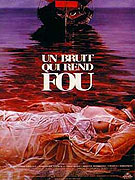
Forgatókönyvíró:
Dimitri de ClercqOperatőr:
Hans MeierZeneszerző:
Nikos KypourgosSzereplők:
Fred Ward, Arielle Dombasle, Sandrine Le Berre, Bob Wade, Christian Maillet, Kristel Dotremont, Dimitris Poulikakos, Robin StewartTartalmak(1)
Egy távoli mediterrán szigeten a helybelieket Frank szellemének visszatérése tartja izgalomban. Frank rejtélyesen eltűnt, miután gyaníthatóan megölte gyönyörű, fiatal kedvesét, Santát. Thieu, a szkeptikus rendőrfőnök elhatározza, utánajár e titokzatos esetnek. Thieu majdnem betéved a babonák és pletykák útvesztőjébe, mely pletykákat különös módon az eltűnt lány mostohaapja terjeszti. A rendőrfőnök egy tekervényes összeesküvés szálait bogozgatja, miközben kiderül, hogy Santa végül is nem halt meg, hanem Sarah Kék Villájának falai közt él, bezárva. Az igazi bűntény a háttérben létező, tünékeny titok... (Budapest Film)
(több)Recenziók (1)
A typical Alain Robbe-Grillet game of self-fertilization and self-destruction of the narrative instance of the work, following the pattern of Maurits Cornelis Escher's drawings, supplemented with pervasive uncertainty both in terms of motivation and the characters' identities. In Un bruit qui rend fou ("An insupportable noise" or literally "Noise, which drives one mad"), the noise referring to the game of mahjong serves as an internal duplication of the very principle of constructing this film (and all the author's other films) in the sense of continuous recombination of basic thematic coordinates. However, the traditional theme of doppelganger and schizoid fragmentation of characters is recuperated too much in Robbe-Grillet's terms, almost too much in the style of poetic surrealism, which leads to the impression of a revived fairy tale about the return of ghosts, etc., while the author's greatest historical contribution in his greatest films lies in the fact that he does not create that sense of "magical realism" through content ambiguity, but only through a formal play with montage, sharp cuts, and the autonomy of the sound component... Here we are dealing with more of a magical realism for the masses, and delirious consciousness is not given by a mere linear game with montage and incompatible time, but rather by the delirium of feverish love 'in the time of cholera' - thanks to which this film is also one of Robbe-Grillet's more accessible films.
()